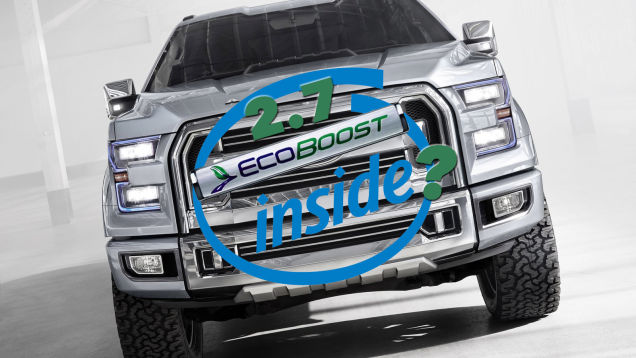Sales of the new, aluminum-bodied F-150 are way down – and Ford is rushing massive discounts into the proverbial breach. According to Automotive News, the F-truck is down 8 percent – a disaster for a brand-new model. The discounts – as much as $10,000 – bode ill for the truck’s prospects because it means re-sale values of already sold F-150s will plummet once word gets out.
This is really, really, really bad news for Ford.
Apparently, concerns about the expense of fixing the aluminum body – and worries about the long-haul reliability of the new “EcoBoost” turbo V6 engines – are at the root of it all.
See here for EP’s take on the F-truck.











Maybe I can afford one then, the profit from these large vehicles is immense and they need something that needs a lot of out of warranty service work, I straddle the fence on GM and Ford , dyed in the wool owners will make a lot of excuses , anybody think the LS will be as good in the long run as the SB ?
Ford had their Forrest Gump moment back when they closed all the customer service zone offices. I left Ford before that defining decision. Ford became just like GM in my opinion. Bean counters at the helm. To hell with Customer Service. Hide defects and hope the law suits don’t bury the company. They are shit holes ala supreme. I use to be a solid devoted Ford customer. In my opinion, Ford engines in every day drivers were much easier to service than GM products. Distributor in the front, easy access to plugs. Tune ups were a breeze compared to some GM products. I remember having to literally jack an 8 cylinder 263ci Monza engine out of the chassis just to change the plugs. Ghastly task involving removing the motor mounts from the frame, removing a bolt on the fan shroud to hinge the top out of the way so the fan could clear it. Oh and don’t forget the distributor had to be removed to keep from damaging it against the bulkhead/firewall. A 4 hour job. The mustang which was its competitor. Easy peasy. No thanks Monza aka GM.
Now? I’ll never buy another Ford product as long as I live. All automobile products have their problems. It is how the company handles service and complaints that keep me as a customer. Ford f’d that up with me pretty good. So now it is Honda and Dodge products that I buy. My Honda has more than 220k on it and still runs like a top.
To bad mandatory insurance doesn’t work in Tennessee. A man with no DL, no tag, no Insurance hit the Honda with his tote the note lot car. I approach an attorney and no humans were hurt eh? f’off. This is the state of responsibility in the US. I can’t even sue the guy because the address he gives the cop is a lie. LOL! Sheesh. Of course, I have insurance but I’m thinking well the state has mandatory insurance so why carry uninsured motorist coverage. A logical presumption in my opinion. Come to find out the cop did issue a citation. I don’t know how that played out since it was the state acting as the injured party. However, the dude did have a suspended DL, just wondering how he will get insurance on that? Things that make you go hmmmmmm……
As for my Dodge truck, we did the trip to the coast in it. I was very happy with how it performed. The truck is a 2005 with more than 100k miles. I do baby it though. I change the oil regular and such. I did have a black ice moment and there is some body damage but the drive train is right as rain. The truck didn’t hickup once during the trip to the coast and back. Very very happy with the performance and given the size of the truck the mileage.
For all I care, Ford can be flushed down the toilet and good riddance. Ford deserves every thing that happens to them in spades! That along with GM of course!.
Well that is just my two cents on the Ford matter.
David Ward
“Ford became just like GM in my opinion. Bean counters at the helm. ”
Narrator: A new car built by my company leaves somewhere traveling at 60 mph. The rear differential locks up. The car crashes and burns with everyone trapped inside. Now, should we initiate a recall? Take the number of vehicles in the field, A, multiply by the probable rate of failure, B, multiply by the average out-of-court settlement, C. A times B times C equals X. If X is less than the cost of a recall, we don’t do one.
When was it not that way? My cousin who is head of the parts dept. in one of the largest SW dealerships once showed me a stack of all the parts recalls and then one of the stacks of Ford recalls……humongous. You just had a lot less problems to deal with with GM but the strategy on everything was the same. The only actual recalls happened when something was so bad the press made a big deal of it.
No recall on the 4L60E transmission in the first half of ’95 but they changed suppliers for the sun gear and cut a huge amount of transmission losses. And they almost always lasted beyond warranty so the customer had to eat that but had it gone on for the whole year or more, then it would have been a major recall and cost GM instead of their customers. All car companies do that. Some suppliers would go under because of these things but they didn’t dare complain.
I once had a thermostat housing sprout a leak on a 440. I bought a replacement and it looked like pure junk on the inside because of bubbles in the metal which was the problem on the original part, sorry pot metal they all used back then and still do. And that crap goes on with every part on a car at some time or another. I’ve seen castings on nearly every cast part at one time or another that had cracks all through it. That’s why the same parts on several brands would result in many more good parts because the problem would become evident earlier and be fixed earlier.
That’s the reason for decades Fords came with defective Firestone tires, one a them BIL things. Sorry tires?, sell em to BIL and put them on new cars. If anyone is old enough to remember the Firestone 721’s they understand it. Back in the 70’s it was Firestone raised letter SS’s on performance cars. So bad the DOT finally made them brand “Not for road use” on 10’s of thousands of them but sold them to dealers anyway and dealers sold them cheap and installed them on anything you had. I recall my dad and his cheapness getting a set that promptly came apart and the tread lasted no time at all even if the tire stayed together. Same for Caddy in the 60’s with Generals. First time I ever saw a Michelin on a new big 3 car I wondered what the problem was. It was along about then that people were raising so much hell about original tires the manufacturers finally had to use a decent tire, not the best tire, but a decent one.
Then there was that debacle of Michelin 16.5″ tires on Mustang ll’s that were a flash in the pan. Lots of people got screwed big time on that one, not only for the tires but the wheels also.
Back in the day I would have paid more for a good tire on anything but that was rare. Nearly every customer had the idea that new cars should have good tires. In the early 70’s it was common for people to buy a new vehicle and install radials on it and that went on all throughout the 70’s. My ’77 El Camino came with bias ply tires and rode on them to the tire dealership where they were taken off and radials installed. Lot of that back then.
Nearly ever new car had under aired tires for an easy ride but when radials were done that way they looked like hell. I don’t know they lasted any longer than bias ply under those conditions and nobody liked the looks of a tire bulged out like that either.
I do keep getting recalls on my Sportwagen TDI. But when I call the dealer to ask about it, all it’s about is some gizmo they (or the EPA?) want to put in the filler neck to be sure I don’t accidentally put gasoline in it.
And you can bet that is not consumer driven.
Maybe the real purpose is to keep red diesel out of the tank?
PtB, you probably hit the nail on the head. Red diesel, big nozzle and before the lawyers realized it they had made a standard fitting so you didn’t get stranded if there were only those small nozzles. I mean, the big nozzle is “standard” in this country and everywhere else as far as I can tell. Fuel trucks don’t even mess with the big nozzle and instead use a 1.5″ hose or maybe a bit larger. I’ve had to wait over an hour and a half to fill the diesel trailer(1000 gallons)with the big nozzle. The fuel truck would have been nice at that point but I did catch a nap.
Gummint has people going around looking for the ability to put red diesel in road vehicles and now probably has them checking every new diesel vehicle for the big nozzle fuel tank.
Just think, if you have reason to have red diesel you could probably use it from now on and never get caught in a car. That could cost the gummint dollars or tens of dollars in taxes. Ain’t no doubt about it, when you no longer have to go to the stealership, there’s not much keeping you from using your tractor diesel in a pickup or esp. a car that flies under the radar. Ain’t no doubt about it, lots of people in the country would rarely have green diesel in that car.
I remember the first time I went to fill up the TDI, at Southern States Coop. I’m trying to get that nozzle to fit and it just won’t go. Finally went inside and the guy says the car diesel pumps are in the middle of the gasoline islands. Those were the 20gpm truck pumps I was trying, and w/my 14 gallon tank, that would not have been a good idea.
Some thoughts on this:
The gamble Ford is taking on the changes is not consumer driven. I think that is a major problem. All the automakers are in some way, making this costly mistake. They are trying to fulfill government mandates most of which are ridiculous, unproductive, doesn’t even do what the government wants it to do and is costly without benefits for either automaker or consumer. They do this rather then build what consumers want.
Yes, truck buyers would like to get better mileage from their F150’s. However not at the cost of usability and utility (and fix-ability). Those come first, mileage, its way down the list for most.
Fifty years ago, the auto industry fought the federal government tooth and nail over every new regulation. I am sure Henry Ford II told federal government drones to f*ck off at times. He could do it because he was not dependent on the government. He had plenty of customers lining up to buy then.
Enough regulation still managed to slip in over the years, decreasing the profitability of the automakers. So government started to hand over taxpayers hard earned dollars when the industry began to have money problems. And of course those came with strings. IMHO, it would have happened even without foreign automakers entering the US market and taking the market share they took.
No one in the industry tells the government off anymore, they lay down and take every thing the current regime tells them to do. Even though those regimes have zero experience in the auto business.
So that is how we end up with aluminum Ford pickup trucks.
I have heard that full size pickups generate about 5k in profits for Ford, GM and Chrysler. Most of their other vehicles generate only a few hundred in profit, and that often small cars at best break even.
Aluminum is always going to be more expensive then steel. Even building half a million pickups out of it won’t change that. Ford, as we are seeing cannot charge more for an aluminum pickup truck. Why? Because the consumer didn’t demand the change.
So the extra costs come out of the profits. In the long run that is a major, major problem.
I think Ford is gambling that people who buy pickups for the “status” of them rather then the utility would be enough. The people who will never use them for work, and really don’t need the power of a simpler V-8 engine. The people who trade them after a few years, long before electronics and turbo’s crap out and before body work is needed just to keep it on the road.
Question for you Eric. Do you know if aluminum 150’s are worldwide? Do you think they will continue to make steel bodied ones for other markets (either by continuing to build the last generation or a new model). They find it worthwhile to build Rangers for non US market, would it be worthwhile to make steel bodied 150’s for those markets too?
richb, you’re right about most everything there except the profit on pickups. Last time I heard an accurate count on that it was well beyond 10K which makes up for all those vehicles that don’t have much markup. And the more whistles and bells they put on them the more the profit margin is so they don’t fight crap like back up cams and the like and you get 360 degree cams as an upgrade and really expensive wheel upgrades and anything else they can think of upgrades.
Back when the Lincoln Navigator had been around a couple years and they were too expensive and didn’t hold up very well, a friend who worked at a Lincoln dealership called me up one day laughing his ass off. He said “hey, if you’ll come buy a Nav and pay full price for it we’ll give you a loaded Marquis”. No bs there, just trying to make it when GM was eating Ford’s ass on the SUV market and the Marquis didn’t sell for crap. The irony there was the Marquis had finally become a pretty decent car(I still see some that look new)but past performance made them unsaleable. GM finally got that little rear-engined two seater right and then discontinued it. They could have done it right and had a big seller but they lowballed hell out of those cars and I can’t even recall their names.
Remember the Eagle? I’d bet lots of folks don’t. You get back to the bird factor with Chrysler on them, cheep cheep cheep…… but with a little better engine and transmission they might have been a success. And a lot of that comes back to reading the market wrong too. All of them did that wrong at times and most could easily have been avoided if they had just listened to customers. Cue beancounters and lawyers.
Eagle and Jeep were all that were left of AMC when Renault spun them back off to Chrysler.
Not unexpected. Expecially for people that cannot afford to take a chance on unknown reliabilty or potentially expensive problems down the road.
These trucks might be as good as Ford thinks. I would rather let someone else be the guinea pig on their nickel. If someone gave me the truck, I might be more willing to use it depending on projected cost of ownership.
25 years go you began to see aluminum work beds on pickups, generally one tons that occasionally carried a heavy load. I recall having a guy with his one ton aluminum bed back down into the barditch so I could back up and drop a big disc plow on the bed off my 4WD tractor. i thought at the time that was a good idea, not nearly so heavy a truck unloaded. The plow marks didn’t show on the unpainted bed so that was a plus too, kept em looking new. But then I began to no longer see those beds and haven’t seen them now for a long time. It might be because aluminum is more prone to cracking and breaking when it’s bent and twisted. I also notice aluminum flat bed trailers are not nearly as common as they used to be. If you carry the same type of load and it’s not really heavy or don’t have to go places that really twist or hammer the trailer they still make sense. I have seen some aluminum lowboys recently but when I saw those trailers loaded it appeared they always hauled some sort of box of indeterminate weight but judging by the RV sized sleeper on the tractors I’m guessing it’s mostly bulk and not weight. That’ll work fairly well most likely and save a lot of fuel.
You can bet welders would have aluminum beds if they’d hold up. But then again, if you need to make a change or mend them, you have to get a welder that will work on aluminum and the stick welders pipe fitters use won’t work for that. Throwing something heavy and beating whee out of it doesn’t work on aluminum either. If Ford were still in the aircraft biz I’d say go for it.
Bring back the Spruce Goose.
I don’t understand why people are so scared of working with aluminum. It’s all about being used to working with it, nothing more.
BrentP,
It might be the unkown or unfamiliarity factor. Some people would prefer to see how the metal works in real world conditions. This will take time (at least 5-10 years) for a track record to develop.
I do not use a truck for work purposes, but I can understand why others (that use trucks for work purposes) might be hesitant to buy an aluminum truck.
BrentP,
I think I misinterpreted your comment. I agree with your comment. People that work (or plan to work) with aluminum, just need to be familiar with the proper procedures with working with aluminum (and use the proper tools as well). (Just the same as with any other metal.)
I don’t believe they’re scared of working with aluminum since few owners are going to own body shops. It’s the type of work a pickup does that makes aluminum less sturdy and more prone to breaking and cracking.
My first foray into the spring/summer grain harvest in south Tx. had me hanging out with a friend who had a Mack with some aluminum parts. One was the engine cradle, a main component for a tractor. Why Mack offered that in their “aluminum” package I don’t know but right off the bat his broke and he was down till he could get another(not easy to find).
Since grain harvest meant large overloads, nobody brought aluminum to the game. Constant vibration and flexing plays hell with aluminum. I’m a big fan of lightweight alloys for lots of things but for a vehicle used to haul loads and esp. over rough ground I’ll take the steel hickey any time. And that’s the very reason I’m sure that many companies who used to use aluminum trailers no longer do.
And when you make aluminum as strong as steel it’s much thicker as you well know. But the aluminum body in my opinion isn’t the sole problem with the new Ford pickups. The other half of that equation I feel is the small engines. Ford really isn’t known for long lasting engines and esp. in work trucks. What Ford is best known for is under-cutting the price of GM pickups and that may be ok for people who don’t work one but the combo of tiny engines and aluminum bodies is too much too fast for the market whether that doubt is fact based or not.
I know two people who bought the 3.7 L V-6(one turbo, one not)in a full size Ford. Too soon to know about either but most people shied away from the whole idea.
I’m afraid for Ford that in a couple years you’ll either own one till it quits or take a huge hickey and Ford will promptly be back in the steel body business and looking for a small, reliable V-8. I’d be calling Isuzu. They make some great small diesel trucks.
I was referring to working with it repair procedures etc. However with regards to cracking etc, just like with steels it comes to making appropriate choices. Now aluminum doesn’t have a fatigue limit like steel does but overloaded steel is going to have stresses above the fatigue limit making fatigue failure possible.
Vibration, well aluminum transfers it much better than steel, but that’s another subject.